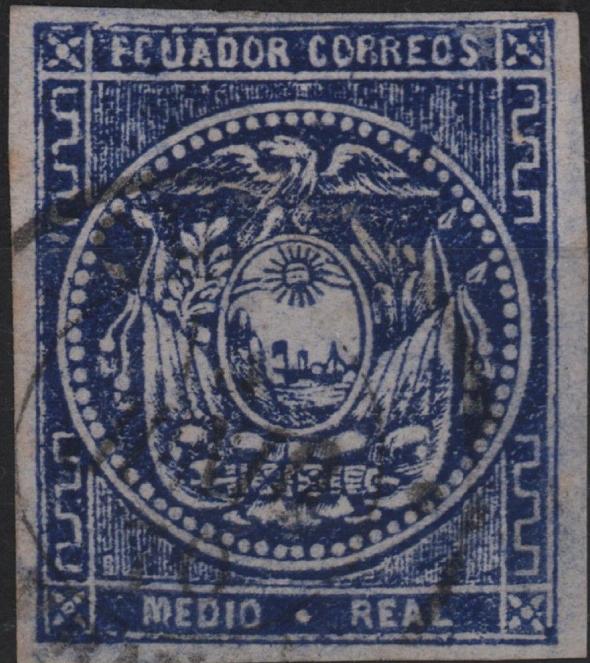
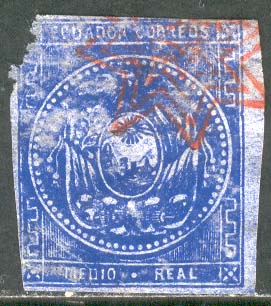
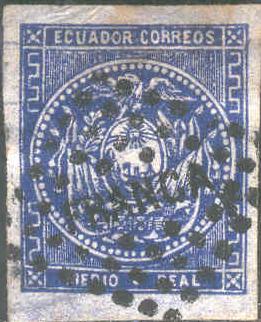
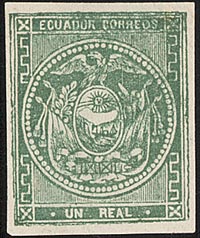
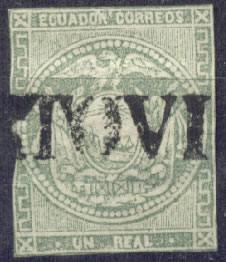
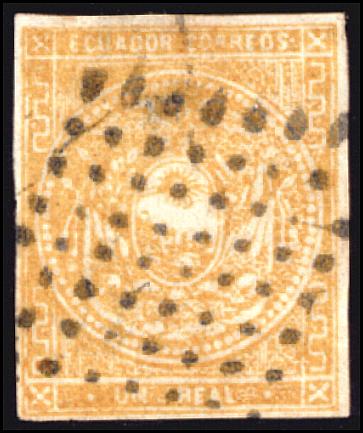
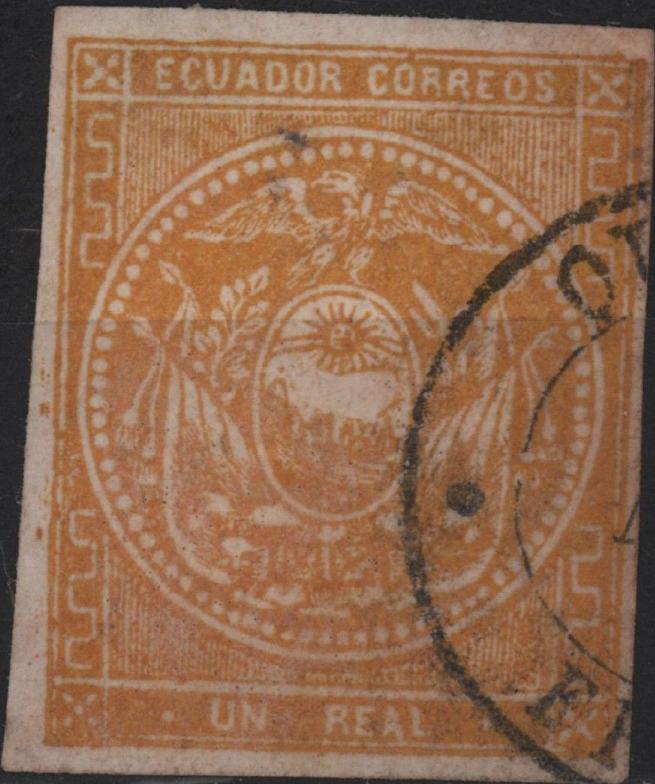
Return To Catalogue - Equador 1896-1920 and miscellaneous
Note: on my website many of the
pictures can not be seen! They are of course present in the cd's;
contact me if you want to purchase them: evert@klaseboer.com.
1/2 (medio) r blue 1 r (un) green (for inland use only) 1 r (un) yellow (for use to foreign countries)
Value of the stamps |
|||
vc = very common c = common * = not so common ** = uncommon |
*** = very uncommon R = rare RR = very rare RRR = extremely rare |
||
| Value | Unused | Used | Remarks |
| 1/2 r | * | * | Fiscally used: c |
| 1 r green | *** | *** | Fiscally used: * |
| 1 r yellow | * | * | |
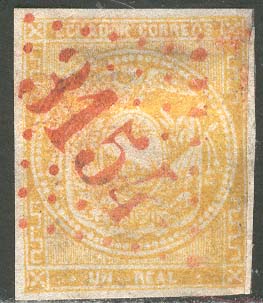
A stamp with the '3154' numeral cancel of Quito (here in red
color).
I've been told that the above stamp is a reprint made from retouched original plates (probably the Rivadeneira reprints). Reprints exist of all values and are not very rare.
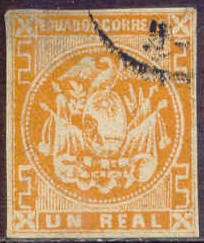
(Primitive forgery with the side ornaments different; not enough
loops)
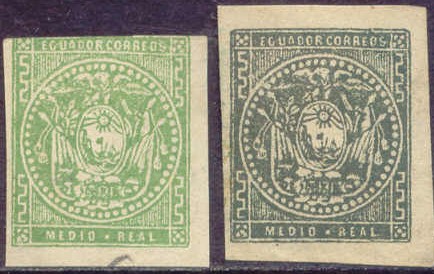
(Forgeries with a very large 'flag' on the ship)
Spiro(?) forgeries:
I think the above forgeries are made by Spiro. I've only seen them with a cancel consisting of dots. Fournier also offers these stamps in his 1914 pricelist (3 values together for 1 Swiss Franc as second choice forgeries). These forgeries were also included in 'The Fournier Album of Philatelic Forgeries'. In my opinion, the line pattern in the left hand bottom side ends too high and this pattern at the right hand side ends with vertical line (in the genuine stamps I've seen it is always vertical). Also note the strange flag on the ship. Fournier also offered first choice forgeries of these stamps by the way. I've also seen the 1/2 r with a circular cancel (with unreadable very blur text inside it).
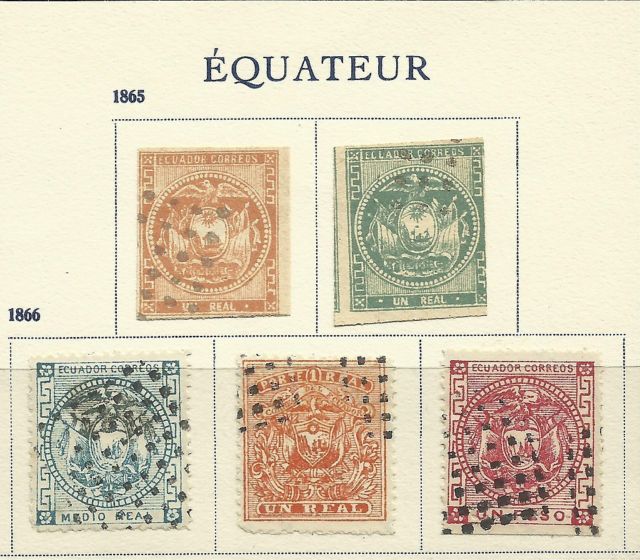
Fournier Album with Spiro forgeries.
Other forgeries:
The above stamps are Rivadeneira forgeries, I have no further information about these stamps. They are probably the so-called reprints, which also exist with forged cancels.
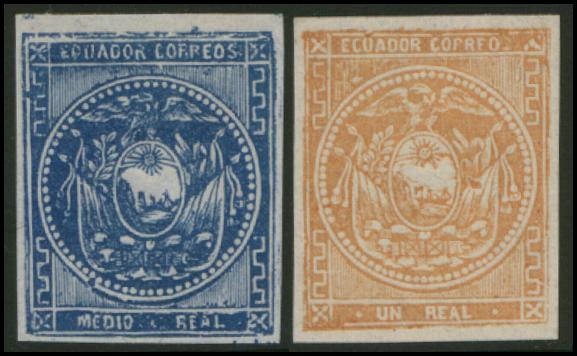
(These forgeries are probably originating from the same source,
note that he 1/2 r has the same 'defects' as in the above
Rivadeneira forgeries)
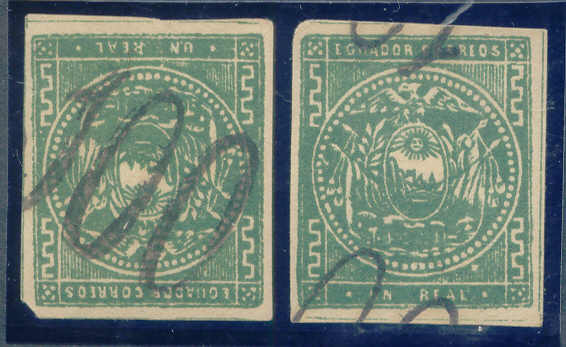

Forgeries, the left ones with '100' overprint (or cancel?)
The above stamps are bogus stamps. There were never any stamps issued in 2 (dos) reales or 8 (ocho) reales. They were made by the Boston Gang (the forger S. Allan Taylor and his collegues). They seem to have made another bogus value 12 r red. They exist used and unused and in different shades. These stamps were described as forgeries in 'The American Journal of Philately' Jan.20, 1869 pages 8-9.
1/2 (medio) r blue 1 (un) r orange 4 r (quatro) red (1865) 1 Peso red
These stamps (except 4 r) have perforation 11. The 4 r is imperforate. The 1 r and 1 P stamps exist with bogus perforations (varying from 6 to 11).
Value of the stamps |
|||
vc = very common c = common * = not so common ** = uncommon |
*** = very uncommon R = rare RR = very rare RRR = extremely rare |
||
| Value | Unused | Used | Remarks |
| 1/2 r | * | * | |
| 1 r | * | * | |
| 4 r | R | R | Two types exist (arms in circle and arms in ellipse). Value of reprints: * |
| 1 P | c | * | |
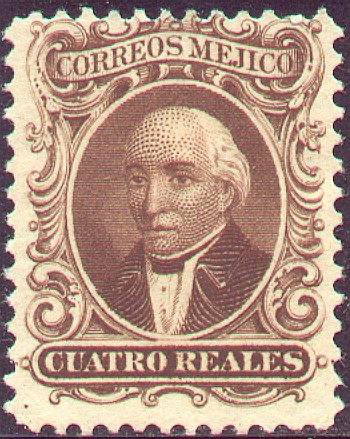
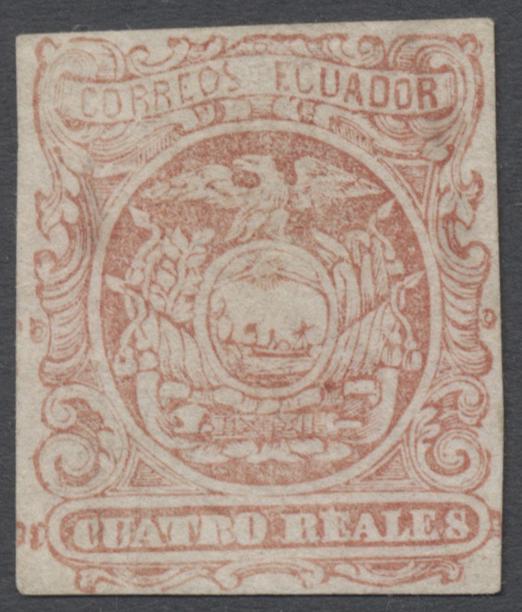
The 8 r was modeled after the 8 r 1865 stamp of Mexico.
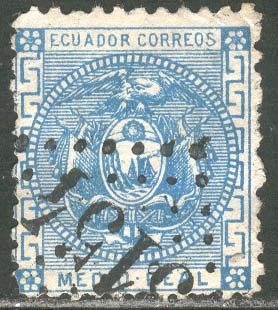
A stamp with the numeral '3154' cancel of Quito.
I've been told that a reprint of the 4 r stamp exists on very thin paper (only in the type with arms in an ellipse). I've been told that 4 r stamps with the head of the condor pointing to the right are proofs, prepared by Emilia Rivadeneira de Heguy in 1886-1887.
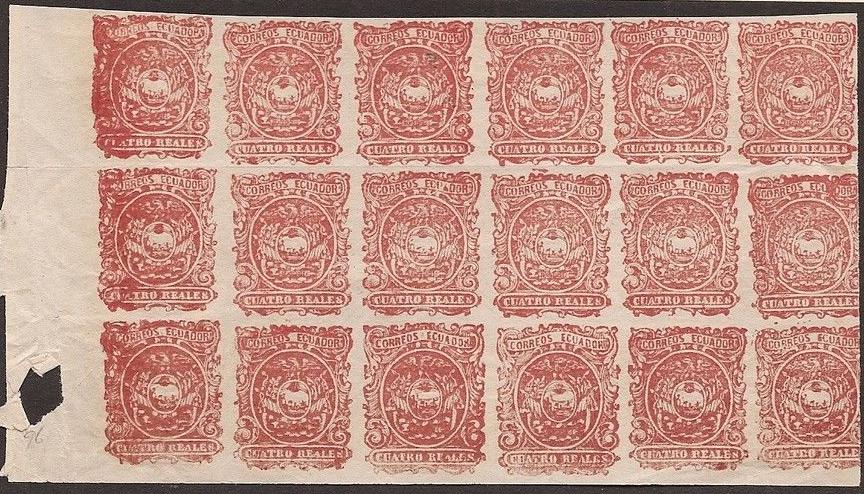
A block of 'reprints'; note that the 3rd and 4th stamp in the
bottom row hae the head of the eagle inverted!

"Proof" with head of eagle in the wrong direction. Here
it is printed in golden yellow, it also exists in blue, black and
green. Usually cancelled with the above purple cancel.
Examples:
In the genuine 8 r stamps, the 'S' of 'REALES' looks more like an '8'.
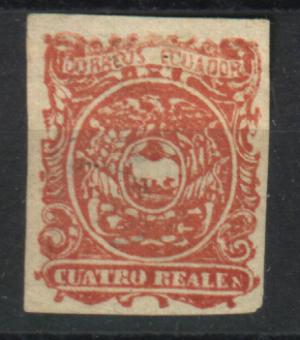
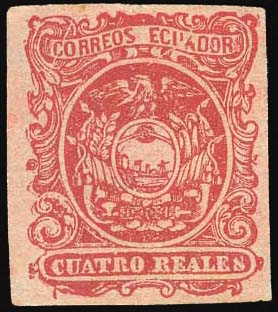
Two different forgeries of the 4 r value
Other forgeries:
I think the above forgeries are made by Spiro.
They are also offered by Fournier in his 1914 pricelist where
they are offered 1 Swiss Franc (all values except the 4 r, as
second choice forgeries). These forgeries can also be found in
'The Fournier Album of Philatelic Forgeries'. I've seen them
cancelled by a pattern of dots or the above shown lines cancel
(typically Spiro cancel). Fournier also offered first choice
forgeries of these stamps by the way.
These Spiro forgeries are quite deceptive. In my opinion, in the
1/2 r and 1 P values, the central hook-shaped line ornament in
the upper right corner should almost touch the central circle in
the genuine stamps. In the Spiro forgeries, it is quite far from
this circle.
The 1 r forgery is quite deceptive and is described in Album
Weeds. However, in the genuine stamps, the horizontal lines
behind the eagle, arms and flags, is much coarser than the
horizontal lines at the outer part of the stamp. In the Spiro
forgery, however, the lines show everywhere the same coarseness.
The condor's neck is also thicker than in the genuine stamps.

Fournier Album with Spiro forgeries.
The stamp forger Dona Emilia Rivadeneira de Heguy is known to have made deceptive forgeries of the 4 r value in 1886-1887.
Further reading: http://guayaquilfilatelico.org/biblioteca/salinas_4_reales.pdf ("El 4 reales de 1866 del Ecuador" by J.Salinas de Lozada, 1944; more than 95% of all stamps of the 4 r found in collections are forgeries according to this book).
Another forgery of the 1 P is listed at http://stampforgeries.com/forged-stamps-of-ecuador-coat-of-arms/.
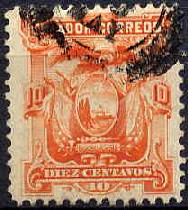
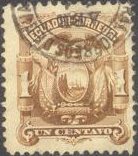
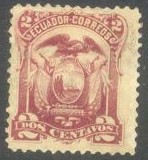
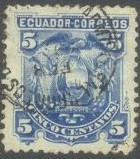
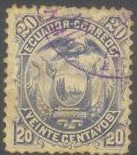
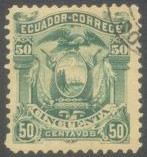
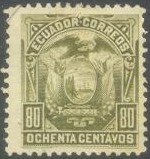
(Reduced sizes)
1 c brown 2 c red 5 c blue 10 c orange 20 c violet 50 c green 80 c olive (1887)
These stamps exist overprinted 'OFICIAL' to be used as official stamps. The overprint can be considered more as a cancel.
Surcharged
'DIEZ CENTAVOS' on 50 c green (1882)
Value of the stamps |
|||
vc = very common c = common * = not so common ** = uncommon |
*** = very uncommon R = rare RR = very rare RRR = extremely rare |
||
| Value | Unused | Used | Remarks |
| 1 c | vc | c | |
| 2 c | vc | c | |
| 5 c | * | c | |
| 10 c | vc | vc | |
| 20 c | vc | c | |
| 50 c | vc | * | |
| 80 c | c | * | |
| 10 c on 50 c | *** | *** | |
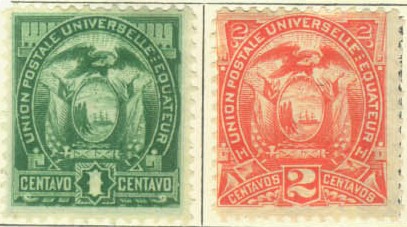
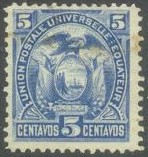
(Reduced size)
1 c green 2 c orange 5 c blue
These stamps have perforation 12.
Value of the stamps |
|||
vc = very common c = common * = not so common ** = uncommon |
*** = very uncommon R = rare RR = very rare RRR = extremely rare |
||
| Value | Unused | Used | Remarks |
| 1 c | c | c | |
| 2 c | c | c | |
| 5 c | c | c | |
These stamps exist overprinted 'OFICIAL' to be used as official stamps (more or less a cancel):
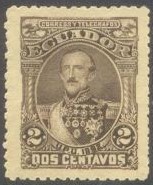
(Reduced size)
1 c orange 2 c brown 5 c red 10 c green 20 c brown 50 c red 1 S blue 5 S violet
These stamps have perforation 12. The 10 c was used bisected in the city of Cuenca in 1895.
Value of the stamps |
|||
vc = very common c = common * = not so common ** = uncommon |
*** = very uncommon R = rare RR = very rare RRR = extremely rare |
||
| Value | Unused | Used | Remarks |
| 1 c | vc | c | |
| 2 c | vc | c | |
| 5 c | c | c | |
| 10 c | c | c | |
| 20 c | c | c | |
| 50 c | c | c | |
| 1 S | c | c | |
| 5 S | * | * | Misprint 5 S green: ** |
Surcharged
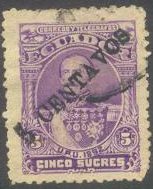
(Reduced size)
'5 CENTAVOS' on 50 c red '5 CENTAVOS' on 1 S blue '5 CENTAVOS' on 5 S violet
Value of the stamps |
|||
vc = very common c = common * = not so common ** = uncommon |
*** = very uncommon R = rare RR = very rare RRR = extremely rare |
||
| Value | Unused | Used | Remarks |
| 5 c on 50 c | c | c | |
| 5 c on 1 S | * | * | Two types of surcharge |
| 5 c on 5 S | *** | ** | Two types of surcharge |
Official stamps; overprinted 'FRANQUEO OFFICIAL' in red
1 c blue 2 c blue 5 c blue 10 c blue 20 c blue 50 c blue 1 S blue
Value of the stamps |
|||
vc = very common c = common * = not so common ** = uncommon |
*** = very uncommon R = rare RR = very rare RRR = extremely rare |
||
| Value | Unused | Used | Remarks |
| 1 c | c | * | |
| 2 c | c | * | |
| 5 c | vc | * | |
| 10 c | vc | c | |
| 20 c | vc | c | |
| 50 c | vc | * | |
| 1 S | * | * | |
These stamps were printed by Seebeck, who made a large number of reprints. This is the first set of Equador to be printed by Seebeck.
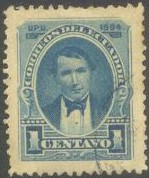
(Reduced size)
Inscription '1894' 1 c blue 2 c orange 5 c green 10 c orange 20 c black 50 c orange 1 S red 5 S blue
These stamps are perforated 12 (the 5 c also seems to exist with perforation 14 and the 5 S imperforate). These stamps were printed by Seebeck, who made a large number of reprints (different colour shades and paper).
Value of the stamps |
|||
vc = very common c = common * = not so common ** = uncommon |
*** = very uncommon R = rare RR = very rare RRR = extremely rare |
||
| Value | Unused | Used | Remarks |
| 1 c | c | c | |
| 2 c | c | c | |
| 5 c | c | c | |
| 10 c | * | c | |
| 20 c | c | * | |
| 50 c | * | * | |
| 1 S | ** | * | |
| 5 S | *** | *** | |
| Reprints | c | ||
Inscription '1894' overprinted 'FRANQUEO OFFICIAL' (red) (official stamps)
(Sorry, no picture available yet)
1 c black 2 c black 5 c black 10 c black 20 c black 50 c black 1 S black
Reprints exist of these official stamps (slightly different colours and paper).
Value of the stamps |
|||
vc = very common c = common * = not so common ** = uncommon |
*** = very uncommon R = rare RR = very rare RRR = extremely rare |
||
| Value | Unused | Used | Remarks |
| 1 c | * | * | |
| 2 c | * | * | |
| 5 c | * | * | |
| 10 c | c | * | |
| 20 c | * | * | |
| 50 c | ** | ** | |
| 1 S | *** | ** | |
Inscription '1895'
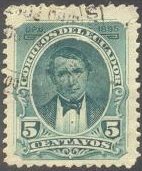
(Reduced size)
1 c blue 2 c brown 5 c green 10 c red 20 c black 50 c orange 1 S red 5 S blue
These stamps have perforation 12. Reprints exist with slightly different colour shades and paper.
Value of the stamps |
|||
vc = very common c = common * = not so common ** = uncommon |
*** = very uncommon R = rare RR = very rare RRR = extremely rare |
||
| Value | Unused | Used | Remarks |
| 1 c | c | * | |
| 2 c | * | * | |
| 5 c | c | c | |
| 10 c | c | * | |
| 20 c | * | * | |
| 50 c | * | * | |
| 1 S | *** | *** | |
| 5 S | *** | ** | |
| Reprints | c | ||
Inscription '1895' overprinted 'FRANQUEO OFFICIAL' (red) (official stamps)
1 c black 2 c black 5 c black 10 c black 20 c black 50 c black 1 S black
Reprints exit of these stamps (colours and paper slightly different).
Value of the stamps |
|||
vc = very common c = common * = not so common ** = uncommon |
*** = very uncommon R = rare RR = very rare RRR = extremely rare |
||
| Value | Unused | Used | Remarks |
| 1 c | *** | *** | |
| 2 c | *** | *** | |
| 5 c | * | * | |
| 10 c | *** | *** | |
| 20 c | *** | *** | |
| 50 c | R | R | |
| 1 S | * | * | |
Inscription '1894', provisional overprint '1897-1898'
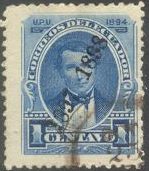
(Reduced size)
1 c blue 2 c orange 5 c green 10 c orange 20 c black 50 c orange 1 S red 5 S blue
Four types of overprint exist. Price: c to R.
Inscription '1895', provisional overprint '1897-1898'
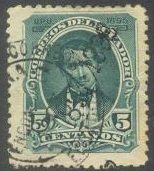
(Reduced size)
1 c blue 2 c orange 5 c green 10 c orange 20 c black 50 c orange 1 S red 5 S blue
Five types of overprint exist. Price: * to ***. Type 5 reads '1897 Y 1898'.
(Sorry, no picture available yet)
2 c on 2 c red
Value of the stamps |
|||
vc = very common c = common * = not so common ** = uncommon |
*** = very uncommon R = rare RR = very rare RRR = extremely rare |
||
| Value | Unused | Used | Remarks |
| 2 c on 2 c | *** | *** | |
(Sorry, no picture available yet)
5 c on 1 c blue 5 c on 2 c orange 5 c on 4 c brown 5 c on 10 c grey 5 c on 1 S red 5 c on 5 S violet 5 c on 10 S green
Value of the stamps |
|||
vc = very common c = common * = not so common ** = uncommon |
*** = very uncommon R = rare RR = very rare RRR = extremely rare |
||
| Value | Unused | Used | Remarks |
| 5 c on 1 c | ** | * | |
| 5 c on 2 c | ** | ** | |
| 5 c on 4 c | * | * | |
| 5 c on 10 c | ** | ** | |
| 5 c on 1 S | ** | * | |
| 5 c on 5 S | *** | *** | |
| 5 c on 10 S | *** | *** | |
For stamps of Equador issued from 1896 to 1920 and miscellaneous click here.